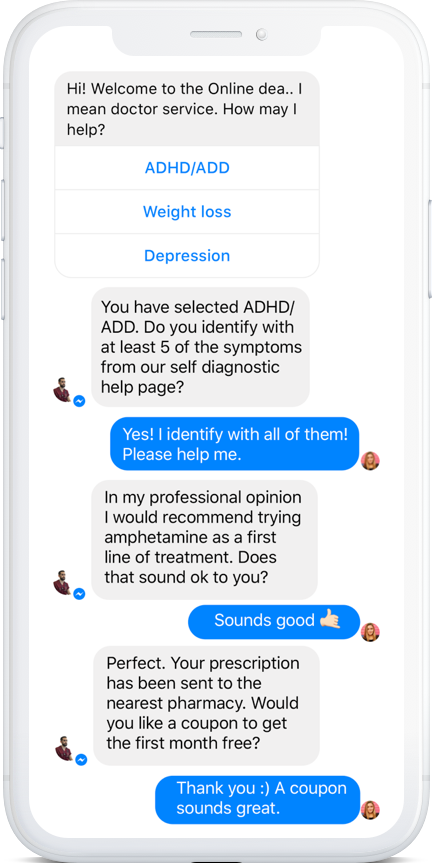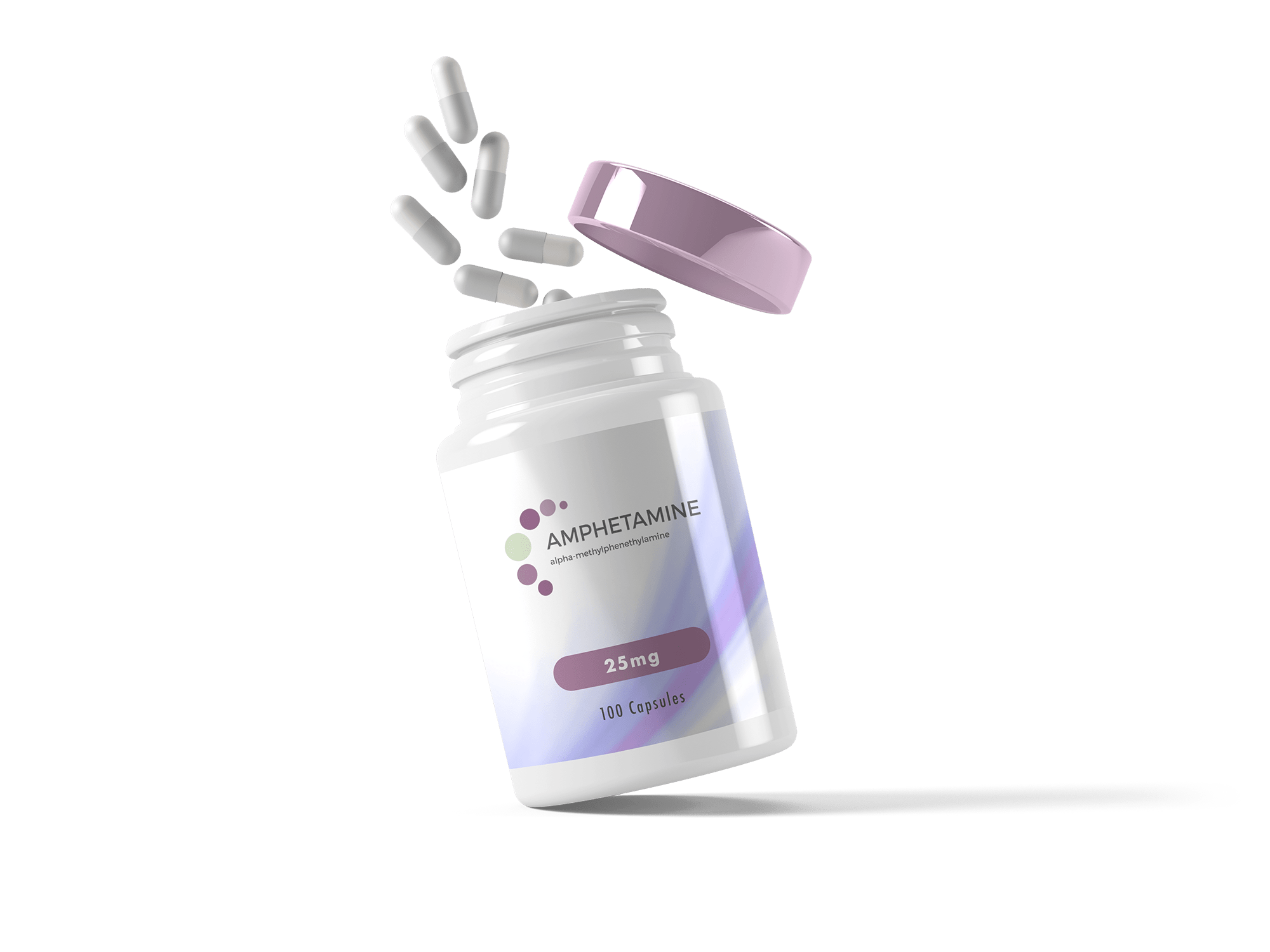Amphetamine is a prescription medicine used for the treatment of ADHD, narcolepsy and obesity. It has been used legally or illicitly by people from a variety of backgrounds, including authors, musicians, mathematicians, and athletes.

IMPORTANT SAFETY INFORMATION
Amphetamine is a federally controlled substance (CII) because it can be abused or lead to dependence. That means that if you are rich enough to afford a doctor and maintain a prescription it's cool. If you are poor and buy it illegally you are considered a criminal and will be put to jail. Keep Amphetamine in a safe place to prevent misuse and abuse.

What is Amphetamine?
Amphetamine is used to treat attention deficit hyperactivity disorder (ADHD), narcolepsy (a sleep disorder), and obesity, and is sometimes prescribed off-label for its past medical indications, particularly for depression and chronic pain.
*Patient portrayal
If you need your life back on track fast, try Amphetamine
Charlotte O. 24, fitness enthusiast, entrepreneur

Why use Amphetamine?
Here is a list of essential information about the effects of Amphetamine you might find helpful. And, of course, talk to your doctor/dealer to learn more information.
- Increased motivationWhen you take Amphetamine, you'll probably feel like you need to be productive. This sudden urge to be productive just might motivate you to do a better job at work, start a small business of your own, find an entirely new career path, or unlock a number of other possibilities.
- Enhanced focusAmphetamine is of unequalled value when it comes to retaining focus. By helping the patients interest in daily affairs Amphetamine has the happy effect of bringing back focus and thereby life for the living.
- Weight reductionThat the fat man is a happy man is a widely accepted yet fallacious folk-lore. Physicans know that being overweight takes years from your life. Amphetamine curbs your appetite making it easier to stick to a healthy low calorie diet.
- Nasal decongestionThe vasoconstriction abilities of amphetamine opens up your nasal passages making it easier to breath freely. You will surely enjoy the fresh feeling of a proper full breath with Amphetamine.
- Increased libidoThis effect can be described as a distinct increase in feelings of sexual desire. When experienced, this sensation is not overwhelming or out of control, but simply remains something that one is constantly aware of.
- AntidepressantAmphetamine may be depended on to alleviate apathy, depression of mood and psychogenic fatigue, and thereby improve the patients general mental outlook in this functional disorder.
Apparently almost 1 out 5 people in the US have ADHD/ADD, chances are high that includes you*
*May not include you. The findings were part of a broader C.D.C. study of children's health issues, taken from February 2011 to June 2012.
Do I need Amphetamine?
This list is an overview of what these symptoms may look like in adults. It is not a diagnostic tool, but you may use this list to ask your doctor for Amphetamine.
Symptoms of inattention:
Symptoms of inattention:
- Often makes careless mistakes and lacks attention to details.Examples: overlooking or missing details or handing in work that is inaccurate
- Difficulty organizing tasks and activitiesExamples: messy, disorganized work; poor time management; fails to meet deadlines
- Often has difficulty paying attention to tasksExample: difficulty remaining focused during lectures, conversations, or lengthy readings
- Lack of motivationOften avoids, dislikes, or is reluctant to participate in tasks requiring sustained mental effort, like preparing reports, completing forms, or reviewing lengthy papers
- Often seems to not listen when spoken to directlyExample: mind seems elsewhere, even in the absence of obvious distraction
- DisorganisedOften loses things like tools, wallets, keys, paperwork, eyeglasses, and mobile phones
- Easily distractedOften easily distracted by other things, including unrelated thoughts
- ForgetfulOften forgetful in daily activities, such as running errands, returning calls, paying bills, and keeping appointments
Symptoms must occur often.
Please note: Only a healthcare provider(such as the one in the chat below) can accurately say if you deserve Amphetamine. Memorizing the list of symptoms will greatly increase your chances of getting the medicine.
Please note: Only a healthcare provider(such as the one in the chat below) can accurately say if you deserve Amphetamine. Memorizing the list of symptoms will greatly increase your chances of getting the medicine.
To qualify for Amphetamine medication your symptoms should be present at home, at work, or at school, and in social situations. For a diagnosis to be made, symptoms must be present in two or more settings.
Home
Work/school
Social settings



Do you identify with the symptoms above? Now what?
Try our new online doctor service!
Have you gone through the checklist above? You only need to identify with 5 or more symptoms to be suitable for treatment with Amphetamine! With our new online doctor service it is faster and easier then ever to get the help you need. Try it now!

Want more info about Amphetamine?
Talk to your doctor today!
Talk to your doctor today!
Amphetamine is a stimulant medicine. Tell the doctor if you or your child have ever abused or been dependent on alcohol, prescription medicines, or street drugs.
Who should not take Amphetamine?
Do not take Amphetamine if you or your child are:
The most common side effects of Amphetamine include:
Who should not take Amphetamine?
Do not take Amphetamine if you or your child are:
- taking or have taken an anti-depression medicine called a monoamine oxidase inhibitor (MAOI) within the past 14 days.
- sensitive or allergic to, or had a reaction to other stimulant medicines.
- if you or your child have heart problems, heart defects, high blood pressure, or a family history of these problems. Sudden death has occurred in people with heart problems or defects taking stimulant medicines. Sudden death, stroke and heart attack have happened in adults taking stimulant medicines. Your doctor should check you or your child carefully for heart problems before starting Amphetamine. Since increases in blood pressure and heart rate may occur, the doctor should regularly check these during treatment. Call the doctor right away if you or your child have any signs of heart problems such as chest pain, shortness of breath, or fainting while taking Amphetamine.
- if you or your child have mental (psychiatric) problems, or a family history of suicide, bipolar illness, or depression. New or worse behavior and thought problems or new or worse bipolar illness may occur. New psychotic symptoms (such as seeing or hearing things that are not real, believing things that are not true, being suspicious) or new manic symptoms may occur. Call the doctor right away if there are any new or worsening mental symptoms or problems during treatment.
- if you or your child have circulation problems in fingers and toes (peripheral vasculopathy, including Raynaud's phenomenon). Fingers or toes may feel numb, cool, painful, sensitive to temperature and/or change color from pale, to blue, to red. Call the doctor right away if any signs of unexplained wounds appear on fingers or toes while taking Amphetamine.
- if your child is having slowing of growth (height or weight). The doctor should check your child's height and weight often while on Amphetamine, and may stop treatment if a problem is found.
- if you or your child have symptoms of serotonin syndrome: agitation, hallucinations, coma, or changes in mental status; problems controlling movements or muscle twitching, stiffness, or tightness; fast heartbeat; sweating or fever; nausea, vomiting or diarrhea. Call your doctor or go to the emergency room if symptoms occur. Serotonin syndrome may occur if Amphetamine is taken with certain medicines and may be life-threatening.
- if you or your child are pregnant or plan to become pregnant. It is not known if Amphetamine may harm your unborn baby.
- if you or your child are breastfeeding or plan to breastfeed. Do not breastfeed while taking Amphetamine. Talk to your doctor about the best way to feed your baby if you take Amphetamine.
The most common side effects of Amphetamine include:
- anxiety
- decreased appetite
- diarrhea
- dizziness
- dry mouth
- irritability
- loss of appetite
- nausea
- trouble sleeping
- upper stomach pain
- vomiting
- weight loss
For additional safety information, discuss with your doctor if you are wealthy enough to afford Amphetamine through the health care system. If not, tough luck :(
You are encouraged to report both positive and negative side effects of in the form of trip reports posted on www.erowid.org to help the community and encourage safer drug use.
You are encouraged to report both positive and negative side effects of in the form of trip reports posted on www.erowid.org to help the community and encourage safer drug use.

Amphetamine is a federally controlled substance (CII) because it can be abused or lead to dependence. That means that if you are rich enough to afford a doctor and maintain a prescription it's cool. If you are poor and buy it illegally you are considered a criminal and will be put to jail. Keep Amphetamine in a safe place to prevent misuse and abuse.
IMPORTANT SAFETY INFORMATION


